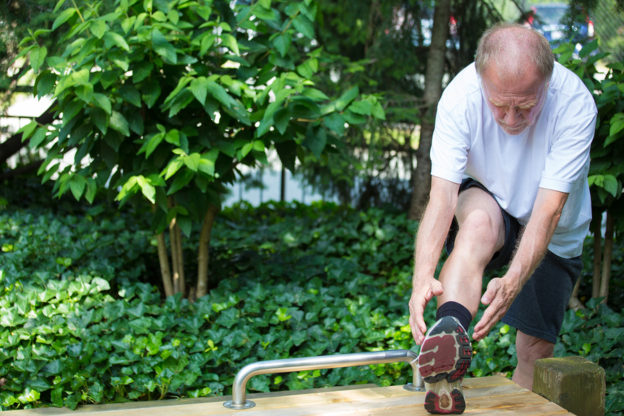By David Blyweiss, M.D., Advanced Natural Wellness
July 11, 2018
- Do you have stiff arteries?
- Weird test may reveal arterial stiffness
- 4 ways to improve elasticity of your arteries
As we grow older, a strange thing happens to our arteries. They start stiffening up. The older we get, the stiffer they seem to become.
And oddly enough, age – in and of itself – is by far the major force behind this phenomena. But that doesn’t mean there aren’t other contributing factors.
High blood pressure, in particular, stresses the walls of the arteries and damages the flexible fibers (elastin) responsible for arterial elasticity. Diabetes, obesity and chronic inflammation are also associated with stiffer arteries. But ultimately, age is still the #1 factor.
When your arteries are stiff…
- Your heart has to work harder to pump blood through them. This causes an increase in blood pressure, which can damage your arteries even further.
- Your chances of a heart attack or stroke go up. In fact, some scientists believe arterial stiffness is a “new” biomarker that should be used to measure and predict cardiovascular risk.
- You are more likely to develop cognitive dysfunction, dementia or Alzheimer’s disease. Stiffer arteries can alter blood flow the brain, damage the microstructure and cause changes in the structure of white matter.
Weird Test May Reveal Arterial Stiffness
MD Exposes the Hidden Danger to Your Eyes

When your eyesight starts to fail, it's a real problem. Suddenly you can't go to the grocery store... you can't get to the doctor if you have an emergency... you can't meet your friends for dinner…
Your "regular" doctor doesn't have time to keep up with the latest research. And the same goes for eye doctors. They go to school to learn how to fit you for glasses and contacts, but have no way of preventing the damage and loss of eyesight that threatens your freedom and independence.
Let me show you something that explains a LOT about how your eyes work.
In my FREE Special Report, I'll show you a HUGE, untapped resource for your eyes that safely and naturally restores clear, effortless eyesight.
Click here to get started...
Now, you can’t see your arteries. So how do you know if they are stiff?
The best way to find out is to have a pulse wave velocity assessment. This is pretty much the gold standard for measuring arterial stiffness. It’s a non-invasive test that simply measures pulse wave signals. In a nutshell, the velocity of the pulse waves correlate to the stiffness of the arteries.
There’s also a strange little test you can perform at home. It may not be entirely accurate, but since people with stiffer arteries perform poorly on this exercise, it could be indicator of arterial stiffness.
Just sit on the floor with your back against the wall and your legs straight in front of you. Then, bend forward at the waist with your arms forward and try to touch your toes.
Can you reach your toes? Can reach past your toes?
If not, you could have stiff arteries. And while this may sound like an odd test, poor flexibility in the body seems to have a direct relationship to poor flexibility in the arteries.
In part, this could be due to the fact that your muscles contain the same elastic fibers that make your arteries flexible. So if you are losing elasticity in your muscles, it makes since you would lose elasticity in your arteries as well. And vice versa.
It’s also likely that fitness plays a role. The more fit you are, the less age-related arterial stiffening you will have. The less fit, the greater the stiffening.
4 Ways to Improve Elasticity in Your Arteries
The World's Quickest Solution for Ending Prostate and Urinary Misery
This has recently been revealed to be one of the only real breakthroughs in prostate health.
The seeds of a strange fruit (sometimes called "Chinese Apples") hold powerful phytonutrients that are a revolution in prostate health.
In fact, UCLA and Veterans Administration research have now proved this to be true.
Not only that, but it may be the worlds quickest solution for ending prostate misery.
Simply stated, these phytonutrients represent a huge step beyond beta sitosterol, saw palmetto, and other phytosterols alone.
Simply click HERE if you want to have fast prostate relief...restful, uninterrupted sleep...no more constant "urges to go"...enhanced virility...and optimal prostate support for life.
While age is closely linked to arterial stiffness, that doesn’t mean you have to give in to it gracefully. There are, in fact, plenty of things you can do to maintain the elasticity of your arteries.
Give yourself a nitric oxide boost. Foods that contain nitrates stimulate the production of nitric oxide (NO) in your body. This is a compound that actually regulates arterial stiffness. It works to decrease endothelial dysfunction. The endothelium being the single cell layer that forms the inner lining of arteries. It helps your blood vessels relax and expand, allowing blood to flow freely throughout your body.
This means lower blood pressure and reduced arterial stiffness which, in turn, slashes your chances of a heart attack, stroke, dementia and mental decline.
Beetroot juice, in particular, is a great source of nitrates. 500 ml (480 ml is a pint) daily is all you need to see the benefits. I add a juiced lemon and an inch of ginger to the mix for a tasty and powerful nitric oxide lift.
If you still find the taste unpleasant, you can use a supplement instead. Just look for a plant-based NO enhancer that has beetroot juice as its main ingredient. (These plant-based formulas vary from one manufacturer to another, so make sure to choose the one that gives you the biggest bang for your buck.)
Get out in the sun. Interestingly, sunlight alters levels of nitric oxide in your skin and blood. But we’ve been taught to fear the sun, so hardly anyone goes outside anymore unless they are slathered up with sunscreen, which prevents your body from absorbing the suns rays.
So try getting about 20 minutes of direct sunlight early in the day between 8-11 am, without sunscreen. It can improve the elasticity and tone of your blood vessels, lower blood pressure, improve circulation and reduce your chance of experiencing a heart attack or stroke.
Don’t forget your omega-3s. Omega-3 fatty acids are great for your circulatory health. These fatty acids work on many levels to protect your heart. They help reduce blood clotting, decrease inflammation and have a positive effect on metabolism.
But the action of omega-3s doesn’t stop there. They are also important when it comes to reducing arterial stiffness and improving blood pressure. I recommend supplementing with a premium mercury-free fish oil supplement. Take between 2,000 and 4,000 mg daily.
Get moving. Remember! The more fit you are, the less arterial stiffness you will have. This makes it important to participate in moderate to intense exercise sessions on a regular basis.
SOURCES:
Obeid H, et al. Arterial Stiffness: A New Biomarker to be Measured. J Arch Mil Med. 2017 ;5(1):e13204.
Hughes TM, et al. Review of ‘the potential role of arterial stiffness in the pathogenesis of Alzheimer’s disease’. Neurodegener Dis Manag. 2015 Apr; 5(2): 121–135.
Yamamoto K, et al. Poor trunk flexibility is associated with arterial stiffening. Am J Physiol Heart Circ Physiol. 2009 Oct;297(4):H1314-8.
Kapil V, et al. Dietary nitrate provides sustained blood pressure lowering in hypertensive patients: a randomized, phase 2, double-blind, placebo-controlled study. Hypertension. 2015 Feb;65(2):320-7.
Presley TD, et al. Acute effect of a high nitrate diet on brain perfusion in older adults. Nitric Oxide. 2011 Jan 1;24(1):34-42.
Here comes the sun to lower your blood pressure. News Release. Univ of Southampton. Jan 2014.
Chaddha A, et al. Omega-3 Fatty Acids and Heart Health. Circulation. 2015;132:e350-e352.







